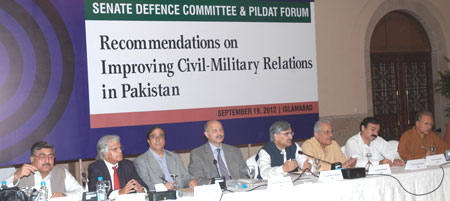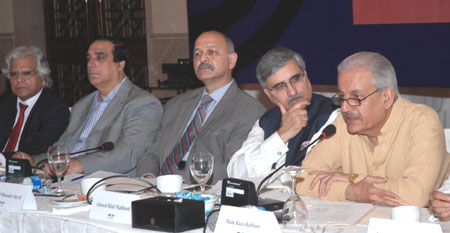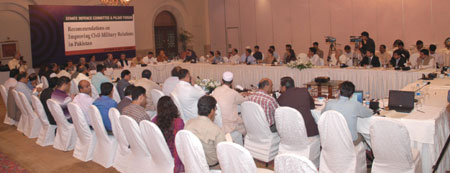|
|
| |
| EVENTS |
|
|
> Political Parties should establish policy think tanks: PILDAT Forum
|
|
|
| |
September 19: Political Parties, eager to represent Pakistanis, can perform better through establishing research and study centres to support policy-making that is rooted in intense, sustained, in-house debate about pros and cons of a course of action in an environment of free thinking and candour. These views were shared at Senate Standing Committee on Defence and PILDAT Joint Forum for Political Parties on Improving Civil-Military Relations in Pakistan. |
|
| |
Political parties at the Forum were represented by Senator Jahangir Badar, Leader of the House in the Senate and Secretary General, PPP, Senator Mian Raza Rabbani, Chairman Parliamentary Committee on National Security, Dr. Tariq Fazal, MNA, PML-N, Senator Mushahid Hussain Sayed, Secretary General, PML, Chairman Senate Defence Committee, Syed Tayyab Hussain, MNA MQM, Mr. Ehsan Wyne, Secretary General, ANP, Dr. Arif Alvi, Secretary General PTI, and Senator Muhammad Akram Shah, Central General Secretary, PMAP, at the Forum.
|
|
| |
Unveiling his recommendations for Politic Parties on developing internal think tanks in a Discussion Paper published under PILDAT banner titled A Blue Print for Creating Think Tanks in Political Parties of Pakistan, Senator Mushahid Hussain Sayed, Chairman Senate Defence Committee, said that as engines of developing policies and institutionalising decision-making, think tanks, or research institutes, attached to political parties are an essential requirement for parties that are serious in delivering good governance to the public. |
|
| |
Traversing Pakistan�s political history for policy decisions, which he referred to as �policy blunders� or those that have had �disastrous repercussions� for Pakistan, Senator Sayed said that institutionalized, well thought out decision-making, anchored in dedicated research and broad consultation, can help political parties, representing the interests of the people of Pakistan, serve Pakistan better. Looking at the emergence and existence of think tanks around the world, how these have helped countries� decision making and how all established democracies promote centres of study and research in parties through state funding, Senator Mushahid Hussain Sayed argued that it is time that parties in Pakistan also focus their energies and resources on establishing dedicated think-tanks to support their work. He also supported state funding for these endeavours on the pattern of established democracies, through a legal, transparent mechanism. |
|
| |
Speaking on the occasion, Senator Raza Rabbani said that the grave challenges facing Pakistan can only be tackled by political parties of Pakistan. The nature of State Pakistan has to be is a decision that has to be taken by political parties of Pakistan jointly in the Parliament. He believed that while national security includes human security, economic and food security, but Pakistan�s current situation demands it should, in the short term, be only defined in the sense of internal and external security. Parliament is supreme and Parliamentary accountability and supremacy has to be the first step towards democratic control of defence. He said that security forces are not one of the 4 pillars of the State. Military has to be under civilian control defined under the ambit of the Constitution of Pakistan.
Senator Rabbani did not agree with re-introduction of the post of a civilian National Security Advisor owing to what he termed �negative� experiences of Pakistan in this regard earlier. He also recommended that since the Parliamentary Committee on National Security (PCNS) has played a key role in working towards establishing Parliamentary oversight on security affairs, therefore a permanent structure to the PCNS and the Kashmir Committee should be given by the current Parliament. |
|
| |
Senator Jehangir Badar, Leader of the House in the Senate of Pakistan and Secretary General PPP, endorsed the views of Senator Rabbani. He appreciated PILDAT�s continuous efforts in the national interest to create political consensus in Pakistan on crucial challenges facing the country. Senator Badar said that the relationship was between civil servants and the military, not between civil and the military. He said that Armed Forces of Pakistan are the key to Pakistan�s security and are respected, revered and protected by political parties of Pakistan. However, there can be no political role of the military in Pakistan. He strongly believed political parties must create internal think tanks focussing on developing policies on defence and national security.
Representing PML-N, Dr. Tariq Fazal, MNA, said that consistency and continuity is required in civilian policies. He also questioned who makes Pakistan�s national security policy. He praised Parliament�s pro-active role in the recent past in 18th to 20th Amendments to the Constitution. |
|
| |
Mr. Ehsan Wyne, Secretary General, ANP, said that ANP has an internal policy think tank where decisions are taken. He said political consensus in the past 4 � years has helped Parliament and coalition Government resolve long-standing issues of this country including that of provincial autonomy. Until the mindset of military does not change, relations between civil society and military can not improve. He also believed that political consensus amongst parties is the key to establishing civilian supremacy in defence and security affairs. Pakistan has paid a huge price in socio-economic terms for retaining its defence capabilities. Military should be used for productive purposes. Political views that are not in sync with the military are termed as anti-patriotic by the military, which must change now, he said.
Dr. Arif Alvi, Secretary General PTI, thanked PILDAT and appreciated the paper, authored by Senator Sayed on establishing think tanks in parties. He said that PTI has been working with a few think tanks but has not known what to do with the product of think tanks. Agreeing with PILDAT�s recommendations, he said that these are crucial for developing Pakistan�s sovereign security strategy. He also endorsed Senator Rabbani�s view that national security needs to be narrowly defined in the case of Pakistan. He said that human security and equal rights for all citizens are the need of the hour. Transparency and freedom of information are key ingredients also. He underscored that an adversarial relationship should not exist between the civil and the military. Establishing civilian control on defence affairs is a long process but must begin with political ownership and good governance by political parties.
Representing Pakhtunkhwa Milli Awami Party (PMAP), Senator Muhammad Akram Shah, said that in established democracies, civil-military relations are pre-determined in Constitutions and legal frameworks. Establishing civilian supremacy is a tall order in Pakistan. All powers need to be with elected public representatives of the country. Military must be consulted on defence and national security affairs but deciding which country is a friend or foe is the responsibility of elected civilian leadership.
Speaking on behalf of MQM, Syed Tayyab Hussain, MNA, said that MQM is very keen to work towards resolving issues and challenges facing Pakistan. MQM believes in working together with Pakistan�s other political parties. He said that MQM will revert as a party on recommendations outlined in the forum.
PILDAT has been working together with leading political parties of Pakistan on the need to develop indigenous and organic policies and internal structures in order to both develop democratic oversight of defence and national security in Pakistan and establish a Constitutional equation of civil-military relations in Pakistan. As an indigenous organisation led by citizens of Pakistan, PILDAT have put together a set of recommendations for political parties in this regard. |
|
| |
Mr. Ahmed Bilal Mehboob, Executive Director, outlined the following recommendations:
- Create Think-Tanks inside the Political Partis
- Designate a Focal Person on Defence/National Security
- Develop a National Security Strategy
- Prepare an Election Manifesto that Effectively Addresses Civil-Military Relations
- Strengthen Defence Committee of the Cabinet (DCC)
ii. Strengthen Ministry of Defence
iii. Parliamentary Oversight on Defence
iv. Parliamentary Oversight on Intelligence
|
|
| |
He hoped that policy recommendations and reform proposals shared at the Forum will be carefully considered, discussed, debated, accepted and adopted with or without modifications by all political parties of Pakistan, especially those, which, over many decades, have come to represent Pakistanis in the Parliament and in successive Governments.
Detailed PILDAT Recommendations for Leadership of Major Political Parties on Improving Civil-Military Relations in Pakistan can be accessed here.
Representatives of political parties, members of Parliament, representatives of research institutes and media also joined the discussion at the Forum.
Participants at the Forum supported PILDAT�s recommendations. They highlighted that integrity and capability of civilian elected leadership is also necessary for establishing civilian supremacy on the military. Political parties need to learn to not provide any support for military intervention. |
|
| |
|
|
| |

|
|
| |
|
|
| |

|
|
| |
|
|
| |

|
|
|
|
|
|
|
|
|